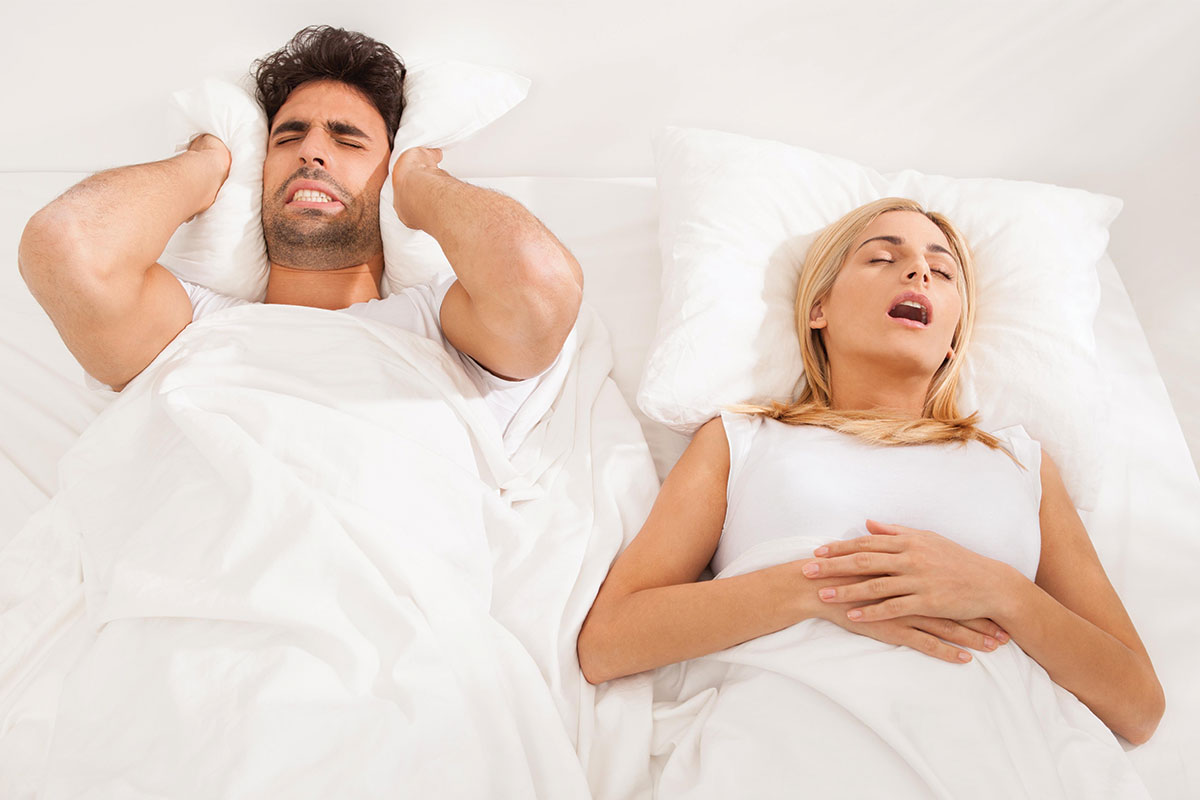
Contrary to common belief, snoring is not a “male” problem. While men are statistically more inclined to snore than women (and twice as likely to experience sleep apnoea), women certainly do snore as well. Yet snoring in females (and also obstructive sleep apnoea) are underreported and underdiagnosed.
In fact, in terms of health risk, snoring is potentially a bigger threat to females than it is to males – but many women tend to underestimate and downplay their snoring.
How does snoring in females differ from snoring in males?
Up to 50% of middle-aged men snore.
At least 25% of middle-aged women snore.
Women’s snoring peaks at around age 60-65.
One in ten middle-aged women has obstructive sleep apnoea.
Males and females who have sleep apnoea or moderate to severe snoring experience:
- Restless sleep
- Gasping
- Choking
- Snoring sounds (this tends to be less intense in women)
Women tend to display several additional symptoms:
- Headaches
- Daytime fatigue
- Stress
- Depression
- Anxiety
- Insomnia
The cause of many of these additional symptoms is often misdiagnosed and inappropriately treated (for example, with antidepressant medications).
What Causes Snoring in Females?
There are many reasons for snoring, including genetics, sleep position, lifestyle factors, anatomical factors, and obesity. Snoring in females has a significant basis in obesity and this is very likely to be closely associated with hormonal factors.
- Hormones: female hormones (oestrogen, progesterone) seem to help protect the integrity of the muscles of the upper airways, including the soft palate, tongue, and nasopharynx. After menopause, snoring and sleep apnoea naturally increase. Women who use menopausal hormone therapy (hormone replacement therapy) after menopause demonstrate a mild but notable improvement in snoring and sleep apnoea.
- Obesity: morbid obesity is twice as common in women than men, according to the British Snoring and Sleep Apnoea Foundation (BSSAA), and women are more likely to have higher fat distribution in the neck area – directly resulting in a propensity for lower airway-based snoring (in the lower throat)*. (Interestingly, premenopausal women appear to have more severe snoring and sleep apnoea than their post-menopausal counterparts with the same Body Mass Index. Researchers have not yet understood why this is the case).
- Hypothyroidism: an underactive thyroid gland causes many of the symptoms also associated with snoring and sleep apnoea, and women who have hypothyroidism are much more likely to snore. It is also strongly linked to obesity.
- Diabetes: like snoring, diabetes is influenced by sex hormones, and both conditions increase in pregnancy, after menopause, and in women with Polycystic Ovarian Syndrome, which is a hormonal condition. Snoring deprives sleep and diminishes blood oxygen levels, and these increase blood insulin – creating a symbiotic relationship where diabetes can cause snoring and snoring can cause diabetes.
Other common reasons why women snore include pregnancy and exhaustion.
(*Males are more likely to carry fat in the mouth and upper airway and to have anatomical abnormalities that contribute to snoring. Testosterone also exacerbates the severity of snoring).
Are Risk Factors Different Between the Sexes?
According to a medical study published in 2018, the cardiac risk for females with obstructive sleep apnoea was greater than that for males. Furthermore, the manifestation of the cardiac effects in snorers differed.
The study considered the hearts of volunteer participants from the UK Biobank. They included men and women who had been diagnosed with obstructive sleep apnoea, habitual snorers, and non-snorers. Males and females who snored or had sleep apnoea were found to have enlarged left ventricular walls, meaning their hearts had to work much harder to pump blood.
The particularly concerning discovery was that there was a much greater cardiac change in women who snore than in men who snore. This suggested that the cardiac impairment in females was greater and that many of these women may have undiagnosed obstructive sleep apnoea.
Obstructive sleep apnoea has been proven to contribute directly to heart disease, hypertension, stroke, compromised blood sugar metabolism (resulting in insulin resistance, metabolic syndrome, and ultimately, Type II diabetes), and even some forms of cancer. It also has mental health and physical safety implications. The study results indicate that these risks are also enhanced in snorers.
Treatment of Snoring in Females vs Males
According to the BSSAA, men are more likely to seek help for their snoring and be referred for a clinical sleep study. This is partly due to long-held stereotypes and the reluctance of many women (and their general practitioners) to recognize and address the issue.
Women must address snoring for their long term health and wellbeing.
It is extremely important that obstructive sleep apnoea be medically diagnosed and treated.
Alongside the commonly recommended snoring treatments and sleep apnoea treatments that apply to both men and women, including weight loss and lifestyle modification, scientists are investigating whether treatment of snoring in females may include hormone replacement therapy. This is found, based on current evidence, to reduce the prevalence of snoring in menopausal females to rates comparable to premenopausal females. It is a concept that requires much more study and careful medical management.
Stop Snoring Solution – SnoreMD
It’s important to understand and resolve the causes of snoring in females. Additionally, taking action to prevent or at least minimise snoring is essential for your general health and well-being.
One simple, affordable, safe, and effective way to address snoring is to use the appropriate anti-snoring device. SnoreMD is your superior option for this.
SnoreMD is marketed within Australia and is the local brand of the device that has revolutionised the sleep of people all over the world. It is patented and medically proven to help stop snoring. Worn in the mouth while sleeping, it is a comfortable device that gently and safely repositions the lower jaw, effectively opening the airways to eliminate some of the causes of snoring.
SnoreMD will not disrupt your sleep or the sleep of your partner. It’s the perfect, rapid snoring solution.
Discover how SnoreMD works or purchase yours today!


